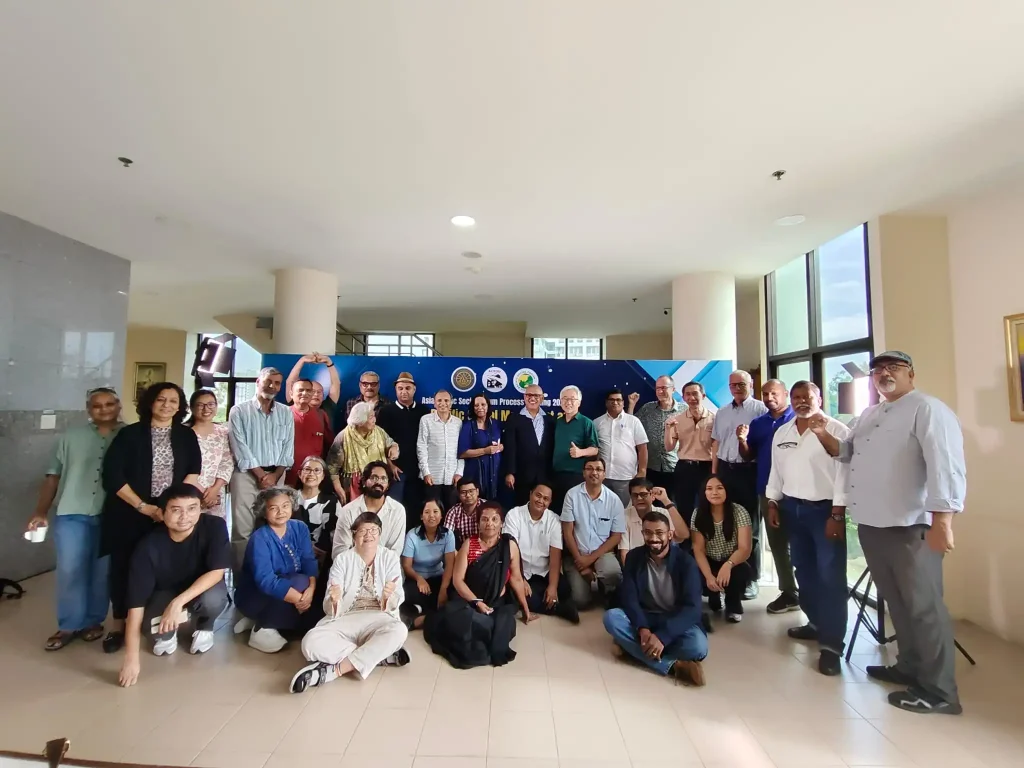Making an Impact:
About APSF

The World Social Forum (WSF) 2024, held in February in Kathmandu, Nepal, was only the second time that the WSF was held in Asia, the first being WSF 2004 in Mumbai, India. WSF 2024 marked a significant milestone with the in-person participation of over 50,000 people, including 1,359 organizations from six continents and 102 nations. Alongside this, the Intercontinental Youth Forum attracted 410 participants from over 30 countries.
The forum hosted over 422 registered activities across 13 diverse themes, addressing critical issues such as economics, migration, discrimination, gender, culture, war and peace, climate change, indigenous rights, human rights, and social movements.

In the “Square of Statements,” more than 60 declarations from global organizations pledged continued efforts toward creating a fairer and more just world. From the media report of the Nepal Organizing Committee after the first day of the WSF: “……. the size of the rally was massive, yet it was the diversity of the participants that stood out in the solidarity march of the 16th edition of the World Social Forum (WSF) 2024. Waves of people from all over the world—many in traditional attire, some in indigenous clothing, others in work wear, casuals, or suits—walked hand in hand with a soaring cry of ‘Another World Is Possible.’ The participants included workers, farmers, trade unions, women’s organizations, LGBTQI groups, indigenous communities, civil society organizations, and social movements from across the globe.”
This remarkable event followed an extensive outreach and communication process with organizations representing various sectors and communities across Asia. This process fostered solidarity among participants and set the foundation for stronger ties in the Asia-Pacific region. For over two decades, the WSF has provided an open space for social movements to dialogue, learn, and strengthen their work. The next WSF is scheduled for January 2026 in Benin, Africa, with preparations underway to facilitate both in-person and online participation.
While most battles are fought locally and nationally, a global platform for sharing experiences, strategies, and solutions is essential in today’s interconnected world. Unlike sectoral or intergovernmental forums, the WSF offers a unique space where diverse people’s movements and networks can interact freely, unified by a shared commitment to a sustainable, just, and equitable world free from war, casteism, racism, sectarianism, and patriarchy yet one where a great diversity of ideologies, perspectives and concerns exist. The overarching slogan of the WSF, “Another World Is Possible,” continues to inspire people to participate in the Forum Asia Pacific Social Forum process.
The APSF process that preceded the successful WSF 2024 in Nepal, has highlighted the value of exchange and solidarity in Asia. Asia and the Asia Pacific is fast becoming the fulcrum of a multi-polar world. The formation of the BRICS bloc is significant in the sense that it acknowledges the growing economic power of countries outside the Group of 7 which consists of Canada, France, Germany, Italy, Japan, the United Kingdom and the United States. These are changes that have immense significance in the changing world scenario, especially in terms of peace and conflict, democracy and human rights, climate change, economic equity and justice. Asian solidarity has not been as strong and consistent as it should be. However solidarity has never been as critical as it is now. The Ukraine war and its repercussions, the genocide in Gaza, Trump’s trade/tariff war, the implications of the rise of China and the BRICS bloc, the erosion of democratic space, rapidly growing disparity, the impact of climate change, all need more interaction and cooperation between the peoples movements in the region. The Asia Pacific Social Forum is an attempt to build broader and better solidarity of Asian people’s movements.
In 1955 when newly independent countries met in Bandung, Indonesia, the balance was extremely unfavourable to the Third World. It was the era of the Cold War. Much has changed since then, and to a large extent the balance is more favourable to these countries, in the new multipolar world. How does this affect the people of Asia? How do we move forward? These are very critical and often confusing questions for people’s movements. Meeting and exchanging views, strategies, building the resistance to create a new world that offers freedom, equity, peace, well being for all is essential. Peace and conflict, democracy and human rights, climate change, economic equity and justice, are the main themes of the APSF for 2025. The process in Bangkok will primarily be based on these thematic areas, while organisations are welcome to register activities/discussions/fora around other issues or cross-cutting themes.

Strengthen Regional Solidarities and Cooperations – Develop collaboration among civil society organizations, grassroots movements, and youth leaders in order to build and strengthen joint efforts to address social, political, and environmental challenges while reinforcing alliances for long-term change.

Enhance capabilities for Strategic Advocacy and Policy Engagement – By building a relevant and diverse policy-oriented discussion base that empowers grassroots movements, informs decision-making, and gives way to coordinated advocacy efforts for justice, equality, and democratic governance.

Sustain Inclusive and Participatory Processes - Through which marginalized communities, youth, and civil society actors actively contribute to shaping policies and fostering a just, peaceful, and sustainable future.
Together We Thrive:
Meet Our Team

Brooklyn Simmons
Web Designer

Ronald Richards
Medical Assistant

